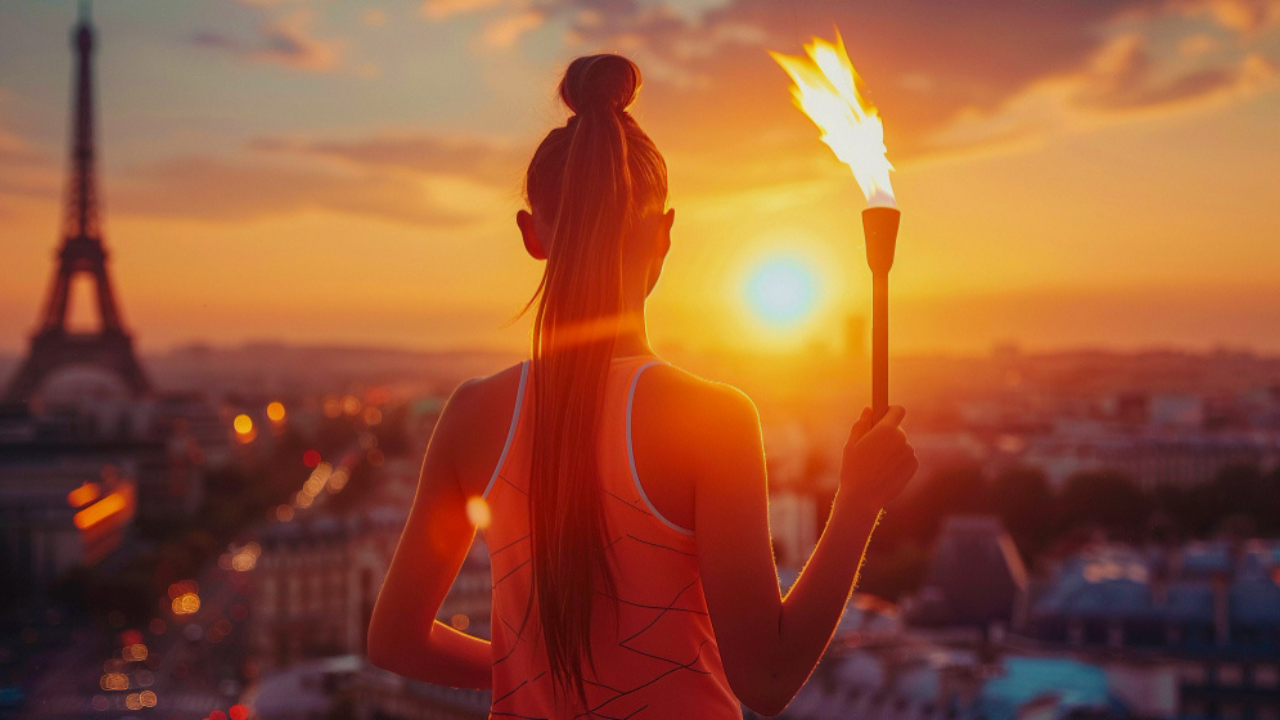AI at the Paris Olympics 2024: How Humanity is Taking the Big Leap!

It has been a few weeks since the Paris Olympics ended, and people are still talking about it! After all, it is a world competition in its truest sense. However, while many people have been thinking about the opening performances and the other highlights of the Olympics (including the controversies), one thing caught my attention— the use of AI at Paris Olympics 2024!
And hey, I am not talking about the use of trending AI apps here. I am talking about the real use of artificial intelligence in making an event work.
The International Olympic Committee, also known as IOC, launched its Olympic AI Agenda in April of this year. It was here that they spoke about their mission of determining the impact of artificial intelligence on sports.
Needless to say, with the implementation of the same at the Paris Games, we all know that they were serious about it.
So, how has the Paris Olympics implemented the use of AI this year? Keep on reading till the end to learn more…
AI Applications in Sports
The Olympics has always been one of the most prestigious sports events in the world. Considering that fact, many of you might be thinking about why they need to have an “AI Agenda.”
Ever since its inception in 1896, why did anything need to change now? Is there anything that humans cannot do, even in the field of sports, that humans cannot? According to the IOC, there are several things.
As per the goals and vision of the IOC, Thomas Bach, the President of the committee, stated that they want to “set the course for the AI future of sport with responsible leadership by embracing the change while preserving the Olympic values.”
Additionally, the IOC’s use of AV technology in the world of sports has revolutionized the way we approach injury prediction, personalized training, and doping detection.
With these in mind, let us take a look at some of the ways through which the use of AI at Paris Olympics 2024 revolutionized the way we look at the event!
Injury Prediction and Prevention with AI
Artificial Intelligence has taken over the world and how. With its implementation across all sectors and industries over the past two years, it was no surprise that it would make its way to an event as big as the Paris Olympics.
Monitoring the energy consumption, generation of highlights, and additional safety measures, there was so much that the IOC planned and implemented with the help of AI this year.
For instance, could we have believed or imagined that we would use AI to predict and prevent injuries during the previous Olympics?
Think about the crashing of the 24-year-old Nina O’Brien, the alpine skier from America, who was injured with a broken leg. The authorities had to take her to the hospital after skidding into one of the gates during the end of her run. This happened just two years back at the Beijing Olympics of 2022.
Or, even worse, and probably one of the most infamous accidents at the Olympics, what about Greg Louganis’ head injury? It happened during his diving at the Seoul Olympics in 1988. THAT could have been fatal.
Now, fast forward to 2024.
The use of artificial intelligence and computerized cameras are some of the things that one can easily prevent. In Paris, the organizers used these cameras to measure the exact distance between the board and the head of the diver.
This ensures that the athlete will not injure their head by hitting the board during their dive. Additionally, it also lets the judges know whether they should deduct a point or two (psst… you can lose two points if your head passes the board at a distance that the judges have deemed unsafe)!
AI Helps with Personalized Training and Coaching
If you thought that the IOC was using AI and implementing it to do only that much, then wait till you get to know this.
As part of their agenda to improve the lives of the athletes, the IOC has taken steps to supercharge the performance of the athletes.
With the help of advanced data analysis, the Paris Olympics used AI to provide coaching and training. This was personalized for the athletes.
The committee tried to ensure that there were tailor-made training sessions that would help the participants train and progress. Hence, apart from preventing injuries that are so common during the event, this implementation also improved the performance of the athletes.
According to Alistair Brownlee, an Olympic gold medallist and one of the IOC members, implementing AI in the training session will also benefit the coaches.
He said the implementation of AI would help the coaches analyze data related to athletes. In a way, AI can help the coaches with the “heavy lifting,” as data analysis is a rather time-consuming task.
With AI doing most of it, the coaches would have time to “work on the human element: their relationship with the athlete, delivering the information in the right way, and doing all the stuff that technology can’t do,” says Brownlee.
Doping Detection Made Easy with AI
Before AI, doping detection relied on random tests and human analysis. It was like finding a needle in a haystack! Testers would collect urine or blood samples and send them to labs for analysis.
But this method was slow, expensive, and often missed cheats. AI changed the game!
By analyzing vast amounts of data, AI can identify patterns and anomalies that human eyes might miss. It’s faster, more accurate, and can even predict when an athlete is likely to dope.
The IOC used AI to catch cheaters who doped. They made sure the games were fair and square. So, how did it work?
The IOC collected a ton of data on athletes – like their training habits, medical history, and test results. Then, they fed all that info into an AI algorithm that looked for suspicious patterns.
The IOC also used AI to improve its testing process. They analyzed past test data to figure out when and how athletes were most likely to cheat. This way, they stayed one step ahead of the cheaters.
And here’s the best part: AI helped reduce false accusations. Sometimes, innocent athletes are accused of doping by mistake. However, with AI, the IOC made sure they only caught the real cheaters. It was a win-win for everyone!
Operational Efficiency with Artificial Intelligence
The Paris Olympics 2024 was a real game-changer! The fact that AI has made tasks simpler and more efficient is not a secret to anyone.
But what really impressed me was how they used AI behind the scenes to make the event run smoothly.
I mean, have you ever been to a huge event like that and gotten stuck in a crowd? Yeah, it’s not fun.
However, the Olympic organizers used AI to analyze how people were moving around. This helped them identify potential bottlenecks before they even happened. It’s like they had a crystal ball!
And that’s not all – they also used AI to reduce waste and save energy. They had smart systems monitoring energy usage across all the venues and figuring out where they could cut back. It’s amazing how much of a difference that made.
AI for the Summaries
So, you know how we always want to see the best moments from the Olympics? Well, at the 2024 Paris Olympics, they used artificial intelligence (AI) to make that happen automatically!
France Télévisions and NBC were two organizations that used this technology to create highlight reels for fans.
Here’s how it worked: AI systems watched the live broadcasts and picked out the most exciting moments, like goals and records. Then, they cut those moments together into highlight reels that were ready to watch on your phone or streaming platform.
NBC even made a daily recap called “Your Daily Olympic Recap.” It was like a personalized Olympic highlight reel, complete with a voiceover from legendary sports announcer Al Michaels!
But that’s not all – Intel also played a big role in making the Olympics more interactive.
They provided the computing power and AI technology that helped make the broadcasts look better and more interactive. This was available both at the venues and online. And get this – they even did the world’s first 8K broadcast in Paris!
Alibaba Cloud also got into action with their Fans Video Hub. This was a place where fans could upload their own videos, which were then shown at the venues and online. It was a really cool way for fans to be a part of the Olympics, no matter where they were in the world.
Wrapping It Up!
Considering we are living in the future, it is only a matter of time before we realize how much more technology and artificial intelligence might change and/or impact the standard of living. With the precision of AI, we can solve a lot of issues with ease and in much less time than before.
Additionally, while people from other sectors of society might have conflicted thoughts regarding how much we let AI influence our lives or occupations, things are simpler for people in sports. This is because, unlike in the case of other sectors, AI can never replace athletes.
In contrast, involving and implementing artificial intelligence would have only (and only) positive effects on the way we perceive sports. As the President of IOC has stated, the “existential question of whether AI will replace human beings” does not bother them in their profession.
All in all, the Paris Olympics 2024 really showed us how we can use AI to make big events better for everyone involved. And who knows, maybe we’ll see even more innovative uses of AI at future Olympics!
Read More…

























